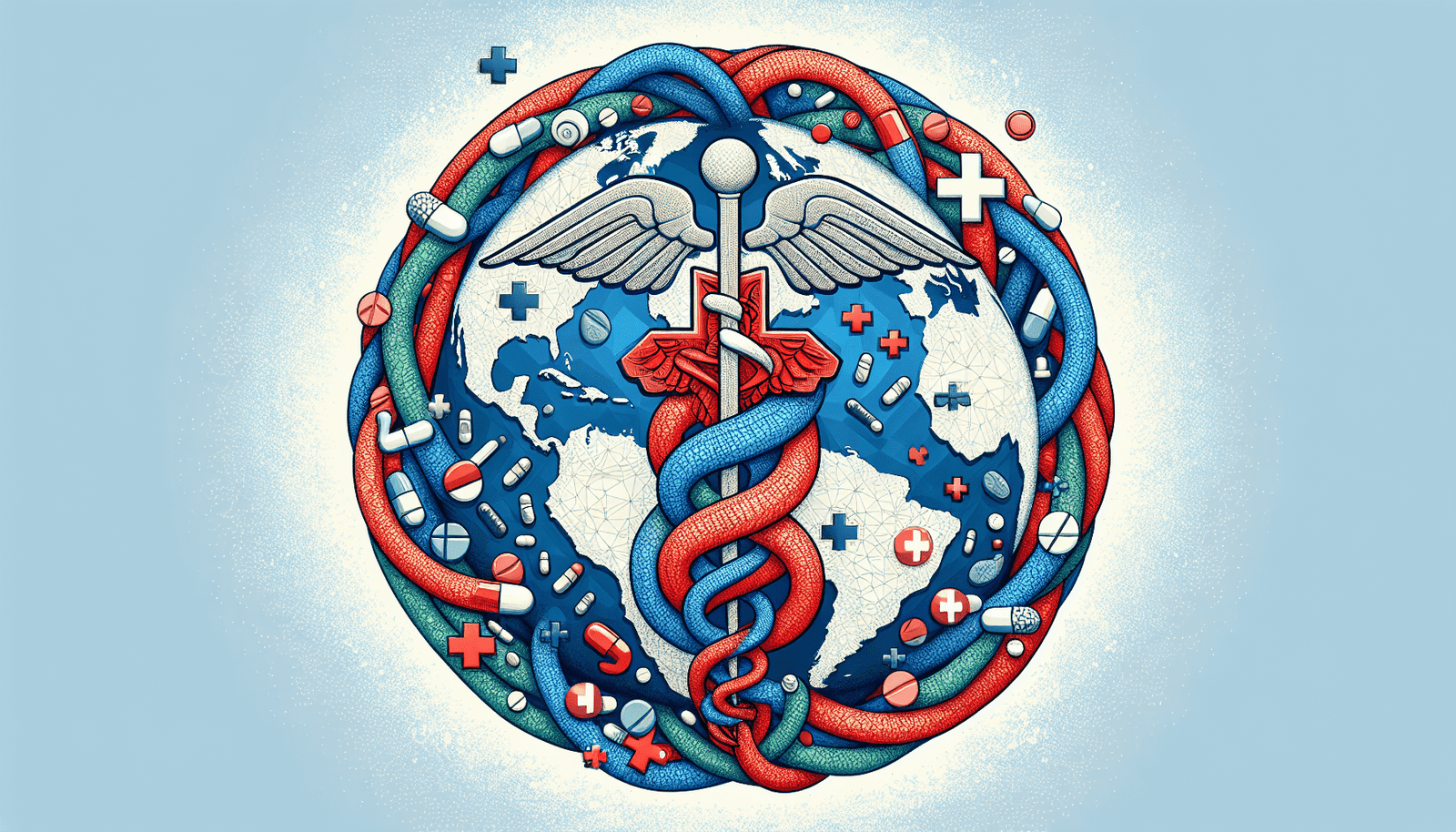Living abroad can be an exciting adventure, but it also comes with its fair share of challenges – especially when it comes to navigating a new healthcare system. As an expat, understanding how to access and navigate the healthcare services available in your host country is crucial for your well-being. From understanding insurance coverage to finding the right healthcare provider, this article will provide you with invaluable tips and insights on how to confidently navigate different healthcare systems as an expat.
Understand the Healthcare System in Your New Country
Moving to a new country can be a daunting experience, especially when it comes to navigating the healthcare system. To make this transition smoother for you, it is important to first understand the structure and organization of the healthcare system in your new country. Each country has its own unique healthcare system, so taking the time to research and familiarize yourself with its inner workings will greatly benefit you in the long run.
Start by gathering information on the public and private healthcare options available in your new country. Public healthcare is usually funded and provided by the government, ensuring access to basic medical services for all residents. Private healthcare, on the other hand, requires individuals to purchase insurance or pay out-of-pocket for medical services. It’s essential to understand the coverage and costs associated with each option so that you can choose the one that best suits your needs.
Insurance requirements may vary from country to country, so it is crucial to research the specific insurance regulations in your new location. Some countries mandate that residents have a certain level of health insurance coverage, while others may have optional insurance plans for individuals to consider. Understanding these requirements will help you determine the type and level of insurance you may need.
In addition to researching the healthcare system itself, it is important to identify any potential language barriers and communication challenges. If you are not fluent in the local language, finding healthcare providers who can communicate effectively in your native language or English is essential. This will ensure effective communication during medical consultations and help you understand the treatment options and instructions clearly.
Research and Choose a Primary Care Physician
A primary care physician serves as your first point of contact for all your healthcare needs. To find the right primary care physician in your new country, start by obtaining a list of local doctors and clinics. Local hospitals, medical associations, or even online directories can be valuable resources in your search. Once you have a list of potential physicians, check their credentials and reviews to ensure they have the necessary qualifications and experience.
Consider the accessibility and proximity of the doctors or clinics to your location. It is important to have easy access to medical care, especially in case of emergencies or urgent situations. Choosing a primary care physician who is conveniently located will save you time and effort in the long run.
After narrowing down your options, contact the selected physicians or clinics to schedule an initial consultation. This visit will give you an opportunity to meet the doctor in person, discuss your medical history, and address any concerns or questions you may have. A good primary care physician will make you feel comfortable and provide comprehensive care, so take this opportunity to evaluate if the doctor is the right fit for you.

Understanding Healthcare Costs and Insurance
The cost of healthcare services can vary significantly from one country to another. To avoid any financial surprises, it is important to research the cost of healthcare services in your new country. This will allow you to budget accordingly and consider the affordability of medical care.
Assess whether you need private health insurance in your new country. While some countries offer comprehensive public healthcare coverage, others have limited coverage or may require individuals to have private insurance. Evaluate your personal healthcare needs and consider the level of coverage you require. Private health insurance can provide additional benefits, such as access to private hospitals or specialty care, but it comes at a cost.
When comparing different insurance plans available, pay attention to the coverage and limitations of each plan. Ensure that the plan covers your specific healthcare needs and includes services you may require, such as regular check-ups, prescription medications, or specialized care. Also, consider the deductibles, co-pays, and maximum coverage limits associated with each plan.
Understanding the process of making claims and reimbursement is essential to avoid any confusion or delays when it comes to healthcare costs. Familiarize yourself with the necessary documentation and procedures for submitting claims and ensure that you are aware of any limitations or exclusions. This will help you navigate the reimbursement process smoothly and minimize any financial burden.
Seeking Specialized Care and Medical Specialists
If you have specific healthcare needs or pre-existing conditions, it is important to identify specialists in your new country who can provide the necessary care. Start by researching and compiling a list of specialists who specialize in your specific condition or medical requirements. Check their qualifications, experience, and reviews to ensure they meet your standards.
Consider seeking referrals from your primary care physician or local doctors in your new country. They can recommend reputable specialists and provide valuable insights into the quality of care provided. Additionally, reaching out to expat communities or online forums can help in gathering recommendations and personal experiences from individuals who have faced similar healthcare challenges.
Once you have identified potential specialists, schedule appointments to ensure continuity of care. Make sure to bring along any relevant medical records or test results from your previous healthcare provider to provide the specialists with a comprehensive understanding of your medical history. Building a strong relationship with your healthcare providers is essential, as it will contribute to better coordinated and personalized care.

Navigating Cultural Differences in Healthcare Practices
Healthcare practices and norms can vary greatly across different cultures. It is important to educate yourself on the cultural norms and practices in your new country to ensure that you approach medical consultations and interactions appropriately. Understanding how healthcare decisions are made and what is considered acceptable in your new country will help you navigate the system more effectively.
Respecting local customs and beliefs during medical consultations is vital. Different cultures may have unique expectations and preferences when it comes to healthcare, and being mindful of these will help foster a positive and respectful patient-doctor relationship. Additionally, by communicating your own preferences and concerns clearly, you can ensure that your healthcare providers understand your needs and can tailor their care accordingly.
Language barriers can sometimes complicate communication during medical consultations. If you are not fluent in the local language, consider seeking translation services or finding healthcare providers who can communicate effectively in your native language or English. This will ensure that you can express your symptoms, concerns, and medical history accurately, enabling your healthcare providers to provide appropriate care.
Understanding Prescription Medication and Pharmacy Services
Being aware of local pharmacies and their services is crucial for accessing prescription medications in your new country. Research the availability of pharmacies and their operating hours in your area. Find out whether there are any specific regulations or requirements when it comes to obtaining prescription medications.
Consult with your primary care physician about your medication needs before your move. This will allow you to ensure a smooth transition in accessing the necessary medications in your new country. Your doctor can provide you with information on generic alternatives or guide you on the process for transferring prescriptions if needed.
Ensure that your regular medications will be available in your new country. Different countries have different medication regulations and availability may vary. It is advisable to check with your primary care physician or pharmacist to verify the availability and any potential substitutes that may be required.
Emergency Healthcare Services
In any new country, it is important to familiarize yourself with the local emergency numbers and procedures. This will ensure that you can quickly access emergency healthcare services when needed. Research and note down the emergency contact numbers for ambulance services, hospitals, and clinics in your new location. Store them in a convenient and easily accessible location, such as your phone or a printed emergency contact list.
Identify the nearest emergency healthcare facilities to your location. Knowing the closest hospitals or clinics that provide emergency care will save you precious time in case of any urgent medical situations. Research the capabilities and services offered by these facilities to ensure they can meet your emergency healthcare needs.
Understanding the process for accessing emergency care is crucial in avoiding any delays or confusion during urgent situations. Find out whether pre-authorization or referrals are necessary for emergency care and be prepared for any requirements. Additionally, ensure that you have the necessary insurance coverage to avoid any financial complications during emergencies.
Staying Updated with Healthcare Regulations and Changes
Healthcare policies and regulations can change over time, so it is important to stay informed about any changes in your new country. Regularly follow news and updates from local health authorities to ensure that you are aware of any new healthcare policies, requirements, or restrictions.
Joining expat groups and forums can be a valuable resource for staying updated on healthcare-related information. These communities often share experiences, advice, and recommendations, helping you navigate the healthcare system more effectively. It is also advisable to attend local seminars or workshops on healthcare-related topics to gain more insights and knowledge.
Regularly review and update your insurance coverage to ensure that it aligns with any changes in your healthcare needs or the local healthcare system. Consider consulting with a healthcare insurance expert or financial advisor who can guide you in making informed decisions about your insurance coverage.
Consider Utilizing Telehealth Services
Telehealth services have gained popularity in recent years, providing an alternative way to access medical care without physically visiting healthcare facilities. Explore the telehealth options available in your new country, as they can be convenient for non-emergency medical needs, follow-up consultations, or minor health concerns.
When considering telehealth services, it is important to understand the process of scheduling online consultations. Check whether the telehealth platform integrates with the local healthcare system and whether there are any language options available for your preferred language.
Evaluate the reliability and security of telehealth platforms before using them for medical consultations. Ensure that the platform and the healthcare providers are licensed and regulated to provide telemedicine services. It is advisable to read reviews or seek recommendations from local expat communities to ensure the credibility and quality of the telehealth services.
Seek Support from Local Expat Communities
Navigating the healthcare system as an expat can be challenging at times, but you don’t have to face it alone. Connect with other expats who have experienced the healthcare system in your new country. Join expat organizations or social groups to meet like-minded individuals who can provide support, advice, and recommendations based on their own experiences.
Sharing your experiences and challenges with other expats can be helpful in finding solutions and gaining insights into the local healthcare system. By supporting each other, you can navigate the complexities of healthcare together and make informed decisions about your health and well-being.
In conclusion, navigating a different healthcare system as an expat requires research, preparation, and adaptability. By understanding the healthcare system’s structure, researching and choosing the right healthcare providers, understanding healthcare costs and insurance, seeking specialized care, considering cultural differences, understanding prescription medication services, knowing emergency healthcare services, staying updated with regulations, considering telehealth services, and seeking support from local expat communities, you will be better equipped to navigate the healthcare system in your new country. Remember to take the necessary steps to ensure your physical and mental well-being while embracing your new life abroad.
